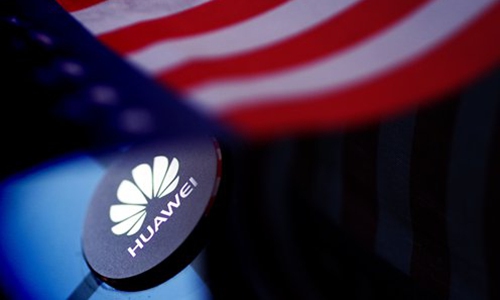HOME >> SOURCE
Why was Huawei able to stand up to US pressure in 2019?
Source:Global Times Published: 2019/12/26 21:03:40

File photo: IC
While attacks from the world's most powerful country turned 2019 into the toughest year ever for Huawei, the Chinese telecom giant is still standing, and doing well.Huawei used to adopt a low-profile approach to do business, but its success, especially in terms of 5G technology, turned it into a target for the Trump administration, which is seeing the company as a threat from China's high-tech strength. For many in Washington, attacking Huawei is a means of weakening China.
From the detention of senior Huawei executive Meng Wanzhou in Canada to placing Huawei on the US Department of Commerce's Entity List, a series of incidents forced Huawei onto center stage in the global tech tussle between the US and China. To give the public a better understanding of Huawei and win a fair business environment for the company, founder Ren Zhengfei granted an unprecedented number of exclusive interviews - 37 - to domestic and foreign media outlets over the past year.
In the meantime, the US bullying didn't stop Huawei from moving forward. So far in the high-profile 5G business, Huawei has signed 65 commercial contracts globally, with more than 200,000 base stations having been shipped, putting it in the top place among global vendors.
As to why Huawei is able to stand up to the most severe challenges, it may have something to do with its strong sense of crisis, which has long allowed it to be prepared for the worst-case scenario. Huawei's chip arm HiSilicon has been secretly developing the back-up Kirin chips to ensure its supply security.
Now some American media outlets are attributing Huawei's success to huge government support, which is wrong and completely ignores the company's huge investment of human and financial resources on research and development (R&D) over the past three decades. Even in the face of political headwinds, Huawei has never stopped investing in scientific and technological R&D, and it plans to invest more than ever.
Huawei invested $15 billion in R&D in 2018 and is scheduled to invest an additional $100 billion over the next five years, according to its website. In the 5G field alone, its R&D spending would exceed 10 billion yuan ($1.4 billion) this year, with more than 10,000 engineers and experts in 5G R&D, Yang Chaobin, president of Huawei's 5G product line, said in June.
Finally, in 5G and other critical high-tech fields, the competition between Chinese tech companies represented by Huawei and their US-based peers will be inevitable. Despite a trade truce between the two countries, a further high-tech decoupling may bring an even more intense storm to Huawei. But political pressure won't crush Huawei, let alone some misleading reports.
Posted in: GT VOICE